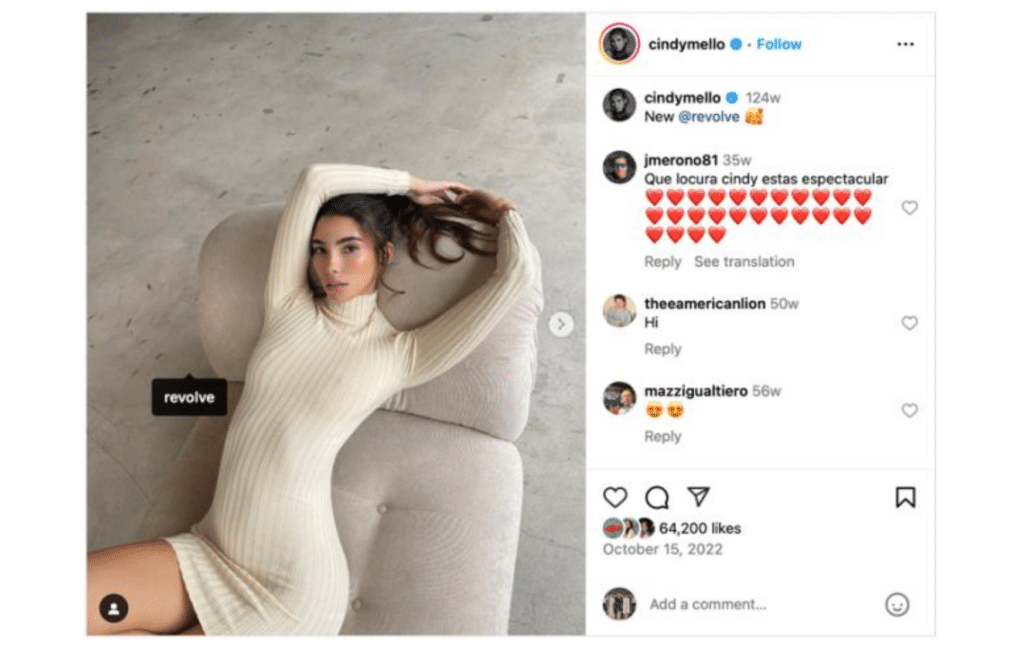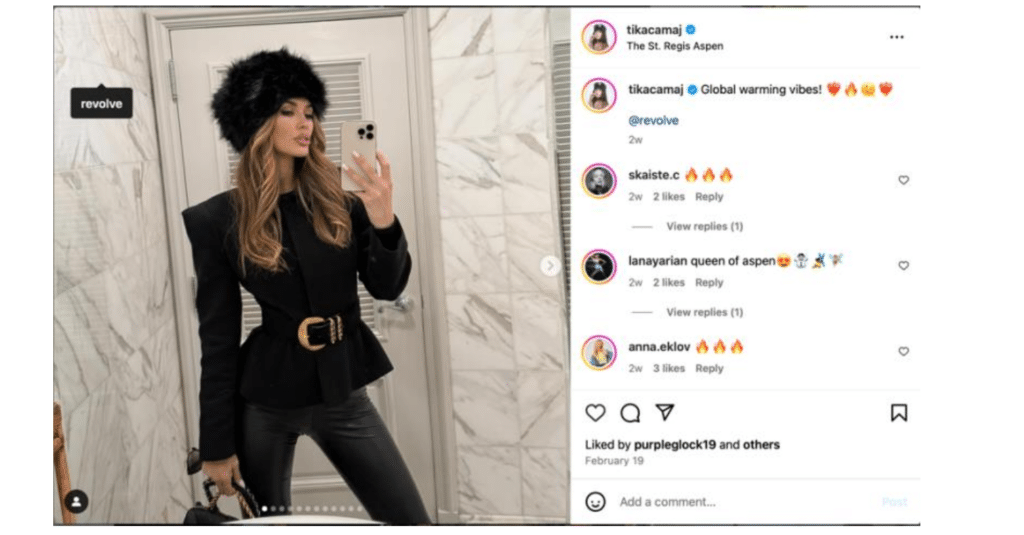Revolve Group has been hit with a proposed nationwide class action lawsuit accusing it and a slate of affiliated influencers of deceptive marketing practices. In the newly-filed complaint that she filed on behalf of herself and a proposed nationwide class of fellow Revolve shoppers, plaintiff Ligia Negreanu alleges that the Southern California-headquartered e-commerce fashion retailer has orchestrated a sweeping marketing campaign that relies on undisclosed influencer endorsements that allegedly violate both federal and state consumer protection laws.
Negreanu alleges in the complaint that she filed on April 11 in the U.S. District Court for the Central District of California that Revolve, FWRD LLC, and Alliance Apparel, among other related entities (collectively, “Revolve”), quietly compensated dozens of influencers with cash, luxury trips, and free products to endorse its offerings. She further asserts that influencers Cindy Mello, Tika Camaj, and Nienke Jansz, who are named as defendants in the case, are also on the hook, as they failed to use Federal Trade Commission (“FTC”)-required disclosures like “#ad” or Instagram’s “paid partnership” label when posting promotional content about Revolve, prompting their followers to falsely believe that their endorsements were genuine and unpaid.
In doing so, the suit argues that Revolve and the influencer defendants misled millions of consumers and artificially inflated the perceived value of the Revolve’s offerings, which routinely command prices that are 10 to 40 percent higher than the same items on competitors’ sites.
A Sweeping Influencer Network
At the center of Negreanu’s complaint is Revolve’s sweeping influencer network, which the company has touted in public filings as a critical driver of its $1.1 billion in annual revenue. According to the lawsuit, Revolve leverages “cost-effective” influencer marketing strategies by providing free merchandise, payments, and perks to influencers in exchange for positive coverage across Instagram and other platforms – coverage that allegedly appeared to consumers as unpaid, authentic endorsements.
According to the complaint, NYSE-traded Revolve’s filings with the Securities and Exchange Commission and investor communications tout its use of social media as a “cost-effective” marketing channel, underscoring how the company “maintains relationships with thousands of social media influencers.”

Hardly an innocent mistake, Negreanu argues that Revolve is “familiar with the law,” namely, the FTC Act, and the FTC’s interpretation of it, which mandates that material connections between an advertising party and endorser that would not be obvious to consumers be “clearly and conspicuously disclosed.” On this front, Negreanu points to Revolve’s 2023 Annual Report, which acknowledges the legal risks of influencer marketing, stating that “in some cases, the FTC has sought enforcement action where an endorsement has failed to clearly and conspicuously disclose a financial relationship or material connection between an influencer and an advertiser.”
Despite such awareness of the law, Negreanu claims that Revolve chooses not to impose disclosure requirements on the influencers that it works with.
Finally, Negreanu insists that Revolve’s competitors comply more rigorously with FTC guidelines by requiring influencers to use conspicuous disclosures. For example, she highlights a.k.a Brands (A.K.A.), a retail group that also uses influencer marketing for its brands. There is “a stark difference in the way both companies work,” per Negreanu. Culture King (a brand in A.K.A.’s portfolio), for instance, “ask[s] influencers to properly disclose the material relationship with the brand by using the ‘Paid Partnership’ label and the ‘#AD’ hashtag placed at the beginning of the caption, to comply with the FTC interpretation of the FTC Act.”
Revolve and its influencers, on the other hand, “are hiding the ‘ad’ hashtag at the end of the post, where the user needs to press ‘more’ to see it, are hiding a partnership tag in between many other hashtags, run it together with other hashtags, or are omitting altogether any reference to the fact that the endorsement is not the influencer’s honest opinion, but rather fully compensated advertising,” the complaint states.
$50 Million in Damages
As a result of Revolve and its marketing network allegedly skirting the FTC’s rules, Negreanu claims that she and other Revolve customers have paid premium prices for products based on what they believed were authentic recommendations. In particular, she contends that “at least one million consumers have purchased products from Revolve and paid a premium for them in reliance on the defendants’ endorsements,” and thus, “at least one million consumers have been injured by the defendants’ deceptive marketing practices.”

Negreanu says she would not have purchased the products if she knew that “the influencers were compensated to endorse Revolve, that the influencers did not pay for the clothes they were wearing, that the influencers benefited from endorsing the brand, and that the influencers’ claims were unfair and misleading.”
With the foregoing in mind, Negreanu sets out claims under the FTC Act, the Florida Deceptive and Unfair Trade Practices Act, California’s Consumer Legal Remedies Act, Unfair Competition Law, and False Advertising Law, in addition to “Little FTC Acts” in more than 20 other states. In addition to certification of her proposed class action, Negreanu is seeking damages in excess of $50 million and injunctive relief.
THE BIGGER PICTURE: This case arrives as regulatory scrutiny of influencer marketing continues to intensify – for Revolve and others. The complaint asserts that early this year, the Better Business Bureau’s National Advertising Division issued a warning to Revolve over its influencer practices, encouraging the retailer to comply with FTC guidelines. More broadly, as brands and influencers navigate an increasingly regulated digital ecosystem, the complaint sends a clear message: influencer marketing is no longer a gray area, it is a concrete legal risk.
A rep for Revolve was not immediately available for comment.
The case is Negreanu v. Revolve Group, Inc., et al., 2:25-cv-03186 (C.D. Cal.).














